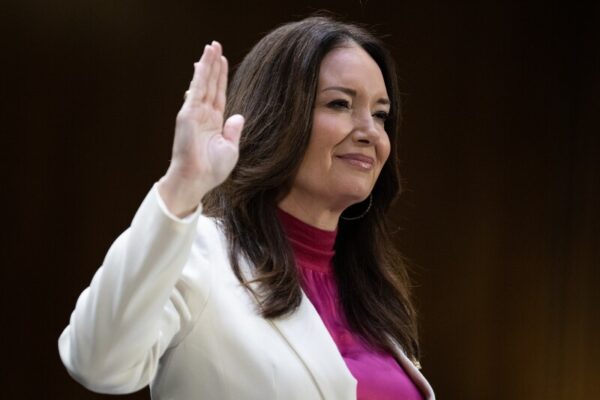In a highly scrutinized Senate confirmation hearing on January 23, 2025, Brooke Rollins, President Donald Trump’s nominee for Secretary of Agriculture, affirmed her support for the administration’s mass deportation agenda.
Rollins described the policy as “a secure border and a mass deportation at a scale that matters,” signaling her alignment with Trump’s hardline immigration stance.
However, her comments have raised concerns about the potential impact on the U.S. agricultural sector, which is heavily reliant on immigrant labor.
Rollins’ statements have prompted mixed reactions. Advocates of stricter immigration controls praised her commitment to enforcing the administration’s vision.
However, farmers and agricultural stakeholders are voicing apprehension about the fallout such a policy could have on labor availability and food production.
The U.S. agricultural sector employs millions of immigrant workers, many of whom are undocumented, to perform essential tasks such as planting, harvesting, and processing.
Without their contributions, industry experts warn of labor shortages, increased production costs, and potential disruptions to food supply chains.
“A Balancing Act”
In her testimony, Rollins acknowledged these challenges and expressed a commitment to mitigating the policy’s impact on farmers.
“That is my commitment, to help President Trump deploy his agenda in an effective way while at the same time defending, if confirmed as Secretary of Agriculture, our farmers and ranchers across this country,” she stated.
Rollins also highlighted her willingness to collaborate with the Department of Labor to enhance the H-2A visa program, which allows foreign nationals to work temporarily in U.S. agriculture.
While the program provides a legal pathway for hiring foreign labor, many farmers argue it is plagued by inefficiencies and bureaucratic hurdles.
Rollins’ pledge to improve the system may offer some reassurance to agricultural producers, but it remains unclear how these reforms would align with the administration’s deportation agenda.
Economic and Social Implications
Experts have expressed concerns that mass deportations could lead to significant economic repercussions.
According to a study by the American Farm Bureau Federation, labor shortages stemming from immigration enforcement could cause annual losses of up to $60 billion in agricultural production.
The resulting increase in food prices would disproportionately affect lower-income households, further exacerbating economic inequality.
Socially, the policy risks destabilizing farming communities across the nation. Many undocumented workers have deep ties to their local communities, including families and children who are U.S. citizens.
Deportations could lead to widespread displacement and strain local resources, such as schools and social services, in affected areas.
Political Calculations
Rollins’ nomination comes at a critical juncture for the Trump administration, which has made immigration reform a cornerstone of its policy agenda.
By supporting mass deportations, Rollins aligns herself with the administration’s priorities, potentially securing her confirmation in a Republican-controlled Senate.
However, her ability to navigate the conflicting demands of enforcing immigration policy while safeguarding the agricultural sector’s interests will likely define her tenure, should she be confirmed.
Looking Ahead
As the debate unfolds, stakeholders from across the agricultural and political spectrum are closely watching how Rollins plans to reconcile these competing priorities.
For farmers, the stakes are high, with livelihoods and food security hanging in the balance.
For the Trump administration, the issue represents a test of its ability to implement its policies without alienating key constituencies, including rural voters who are both farmers and staunch supporters of the president.
Whether Rollins can deliver on her promise to balance enforcement with support for the agricultural sector remains to be seen.
What is certain, however, is that her leadership will shape the future of U.S. agriculture and its workforce for years to come.
Also Read
Oklo’s Surge: A Glimpse into the Future of Nuclear Energy and Innovation
